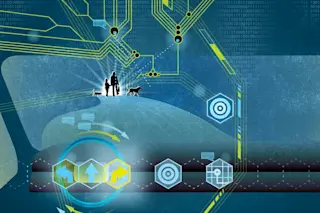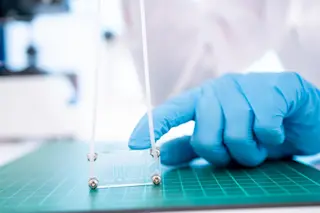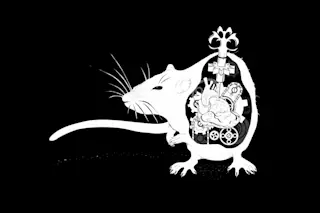As a former chairman of George W. Bush’s President’s Council on Bioethics, Leon Kass is well acquainted with controversy, and with the treacherous terrain at the nexus of science and politics. The council, tasked with advising the president on such hot-button issues as stem cell research and cloning, has sometimes been dismissed as a vehicle for the right wing of the Republican Party. But although some of his views comport with those of hard-liners, Kass, a physician with a Ph.D. in biochemistry, is hard to pigeonhole. “I do not come from a school of thought, nor do I have an ideology,” he says.
An old-fashioned moralist, he holds some views that are remarkably unfashionable—even premodern. He still employs the term bastard to describe the children of unwed parents, and he has written despairingly about the loss of “female modesty” in our culture. At the same time, he has misgivings about the effects of global capitalism and believes in integration, tolerance, and inclusiveness. In the end, what really rankles many scientists is Kass’s belief that society has a duty to regulate research, and his frequent warnings about the dehumanizing effects of some technologies.
The recommendations of the Council on Bioethics, though substantive and scholarly, have by and large not been put into practice by policymakers, and the group’s prominence has faded as the debate about stem cell research has ground to a standoff. Kass left the council in September and currently is a fellow at the conservative American Enterprise Institute for Public Policy Research, where his office is a few paces from Lynne Cheney’s. He sat down with DISCOVER to reflect on his tenure and discuss his beliefs, his influences, and his concerns for the future.
You were chairman of the Council on Bioethics, yet you don’t regard yourself as an ethicist. Why?
I do not present myself as having professional ethics expertise, the existence of which, in fact, I have doubts about. The term ethicist is of recent vintage. I prefer to say that I engage in moral reflection on various matters of human experience but look at them not through the lens of any ethical theory or system. I’m an old-fashioned humanist. A humanist is concerned broadly with all aspects of human life, not just the ethical.
How did you develop this perspective?
My parents were one of my major influences. Both were immigrants from Eastern Europe with no formal schooling. My father had a clothing business on the South Side of Chicago. My mother read novels late into the night. It was a Yiddish-speaking, secular, socialist-leaning home, like lots of others around that time, but with a very strong emphasis on doing the right thing and being a mensch. Moral questions were discussed around the dinner table.
I was an early protester against the Vietnam War. I was probably something of a peacenik. My wife and I did civil rights work in Mississippi when I was still in graduate school at Harvard. And I came back with this question: Why was there more honor among these poor black farmers in Mississippi than among my fellow graduate students at Harvard? The answer seemed to me to have something to do with their religious faith.
A question you’re currently taking on is how we should deal with progress and technology.
I think lots of things conspire against dealing in a sensible way with technological advance. There’s a large cultural bias toward progress, a belief that innovation is good innovation. We love the freedom of scientists to inquire, of technologists to invent, of entrepreneurs to develop, and of customers to buy what they want. The country runs on this principle. I’m inclined to a more classically tragic view in the sense that all the good comes with some bad. We pay a price for everything. And you pay a higher price if you don’t know that you pay a price. In the biomedical area, the people who are bringing you all the novelties occupy the moral high ground. They are humanitarians. They are interested in curing disease, ending suffering, extending life. If anybody says, “Let’s go slow here,” it looks like the imposition of a narrow religious view on what is a pluralistic society, and the response is “Get your morals off my science.”
What about the commercial pressures of innovation?
Some of my old friends in the sciences are very worried about the biotech companies and how their intrusion into academic science skews the agenda. The commercial interests that are in favor of pushing the envelope are very, very well established. And there are no economic interests in favor of going slow. In Europe in the aftermath of the Holocaust, the concern for human dignity became embodied in the law. Americans, by and large, fly the banner of liberty and equality. We don’t have the public language—other than religiously formulated language—for dealing with some of these things.
Are there any innovations you think should be prohibited? I’m in favor of legislative bans on only a couple of things. Because the evils are so intimately connected with the goods, you don’t want to kill the goose that lays the golden egg. But I would ban human cloning. And I would keep physician-assisted suicide and euthanasia illegal.
What else troubles you about contemporary medical research? For my money, the area where we should be most concerned is psychopharmacology and the uses that go beyond treatment for clear psychiatric disorders—the whole family of mood-altering, euphoriant drugs that separate satisfaction from the human activities generally responsible for our achieving satisfaction. This is not puritanism on my part. I’m concerned about a society in which people refuse to take responsibility for themselves, about a society in which human aspirations are short-circuited because achieving them is too difficult and too painful. We’re treating grief as a problem to be solved.
What about people who have endured horrible traumas? Shouldn’t they be allowed to suppress their bad memories with drugs? I have absolute sympathy for people who were in the World Trade Center or people who have experienced rape who want to have some way of blunting these memories to minimize the trauma. I’m all for doing this. But this is also going to foster the possibility of eliminating memories of acts that are shameful, acts in which we behave disgracefully, acts for which we should feel guilt and remorse and seek forgiveness. To sit as editor of our memories is to acquire a life other than the one we have truly lived, to fabricate an identity that is false to our lived experience.
You’ve raised concerns about the “medicalization” of society. But isn’t it too late?
I taught my first bioethics course last spring. In several areas, the class did better than my council in seeing the dangers in the use of psychotropic drugs in children. There were several students who had been on Ritalin. And they spoke with subtlety about what it meant to be on this medication and how they differed from some of their friends who had toughed it out. I think most young people would like to be really happy rather than appear to be happy. Do they want the pleasure of hitting the baseball to come out of a bottle, without ever learning to hit the ball? No. They know the difference between excellence and mediocrity, and they want to feel the sense of their own accomplishment.
But you’re not categorically opposed to the use of such drugs.
I’m not some sort of ogre who wants people to suffer for their own good. We learn sometimes when we suffer, but I don’t approve of somehow increasing the amount of suffering in the world.
One of your most noted accomplishments as council chairman was the report “Reproduction and Responsibility.” What were the council’s goals in publishing that report?
There were certain boundaries we wanted to erect: no pregnancy except to give birth to a child; no human embryos placed in animals for any reason; no fertilization of a human egg by animal sperm or the reverse; no buying or selling or patenting of human life at any stage; no child conceived except by the union of one egg and one sperm, both taken from adults. The point is that no child conceived with the aid of assisted reproductive technologies should be denied the lineage and biological ties to two parents that all children born “naturally” have. No child should have to say, “An embryo was my father.”
What kind of impact did that report have?
A few of our recommendations were enacted into law last year. The language was carefully worked out so as to satisfy both the pro-life and scientist members. We have shown a way to come together in defense of commonly held values, even while continuing to disagree on the moral status of human embryos. Our example, and the specific proposals, should be of interest to anyone wishing to overcome the current stalemate in Congress.
Why did stem cells become the dominant bioethical issue?Stem cell research was everybody’s Public Issue Number One—God knows, really, why. Partly as a legacy of the way the abortion decisions came about in this country and the degree to which abortion is important in American politics, killing and destruction-of-life questions have come to be regarded as the bioethical questions, whether it’s euthanasia at the end of life or abortion and embryo destruction at the beginning.
Scientists recently announced that they have found a way to turn human skin into cells that have all the therapeutic potential of embryonic stem cells. How does that change the debate?
This is what everybody has been waiting for. They’ve hit a home run. One of the most popular things the council did was to suggest science could come to the rescue and find a way around an ethical impasse to produce a mode of obtaining stem cells that everybody would regard as ethical, and that this vexed period of our politics could be put behind us. This is just really quite thrilling.
The Bush administration has been accused repeatedly of injecting politics into science. Did you experience that?
We were not interfered with at any time. The president got a copy of the “Reproduction and Responsibility” report only the day before it went public, as a courtesy.
Another of the council’s far-reaching reports is titled “Beyond Therapy.” What’s the difference between medical therapy and medical enhancement?
There is no bright line. But therapy, classically understood, is the removal of disease or disability and the restoration of health and normality. Enhancement would seem to go beyond the natural given powers, whether to increase IQ and memory or to boost athletic performance by steroids or by genetic modification of muscles. A number of questions are raised by this. First among them is, how do you know that the change is in fact a betterment? Nobody would question the correction of a cleft palate. On the other hand, there is the case of the surgeon who removed part of a woman’s breast because it interfered with her golf swing. There is a distinction between serving the patient’s health and serving the patient’s desires. And there’s a lot of gray area in between.
So are you opposed to plastic surgery?I’d feel much better if they had some kind of body technicians who were not trained physicians to do this. It is a kind of corruption of the art to put it in service of satisfying people’s desires—even when some of those desires are reasonable. I’m somewhat old-fashioned on that subject. If medicine is not guided by some kind of commitment to wholeness or healing, it’s reduced to being a simple body shop where technicians for hire perform.
Are we too focused on personal happiness?I think some of that is true. Families are more atomized. On the other hand, there is at least the recognition that we’re in trouble. There’s an enormous amount of work being done on what’s come to be called civic engagement.
Religious institutions are part of that. Are you a believer?I’m a member of a synagogue in Chicago. I don’t really know the answer to this question.
That usually means no.Well, take a simple aspect of it. Do I think there’s an afterlife? I don’t think I’ve spent five minutes of my life with that expectation. I’m agnostic on the question. However, I like the idea of living as if I’m going to have to answer for what I’ve done. I feel grateful. Do I know to whom or to what I feel grateful? I’m not sure. Am I aware that there are powers that move me in ways that are not at my disposal and under my control? Yes. Do I think there is an old man upstairs with a long beard who takes calls from room service? No.
What are the most significant bioethical issues of the future?One of them is the large question of the health-care system. It’s partly a bioethical topic. Some people put it in terms of justice. Some people put it in terms of rights to health care. My preference would be to say something along these lines: What does a decent and prosperous society owe to the health of its citizens? The crisis of ethical long-term care for the elderly might be the most important issue we took up in terms of how it affects the lives of pretty much all the families in the United States. Scientists hope for a magical cure of Alzheimer’s. I have it in my family. It’s depressing. Forty percent of us right now die after a period of enfeeblement, debility, and dementia lasting up to a decade. That’s the most common trajectory toward death. In the more biotechnical areas, I think the possible hazards have to do with genetics. And pharmacology: Drug-induced pleasure or feelings of self-esteem are shadows divorced from the underlying human activities that are the essence of human flourishing. We want to feel good about ourselves, but only as a result of doing and being good.
Are you hopeful that people will voluntarily take that hard road to happiness rather than the easy way out?I don’t have any illusions about how easy it is to turn the culture around, but I’ve never had any dealing with any person who didn’t have some aspiration to the good.














